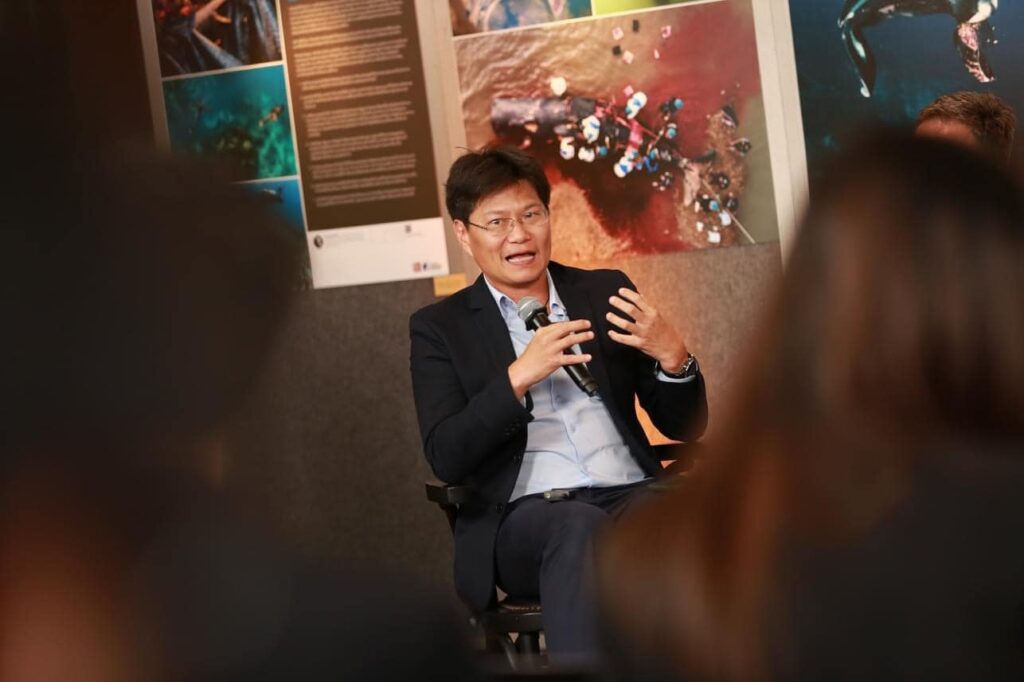It cited remarks in good faith and no intention to defame to drop the case
The Criminal Court yesterday ruled in favour of the marine scientist after hearing testimonies from him and his plaintiff, a pet food trading company, saying his remarks were made in good faith and he had no intention to defame the plaintiff, according to the lawyer team from EnLaw, which represented him at the court. So, the court decided to dismiss the case.
The court had deliberated to see whether Dr. Petch’s remarks defamed the plaintiff or not and it viewed they were general comments made against shark consumption. They were not specifically directed against the plaintiff nor intended to accuse it of lacking conscience, the court noted.
Dr. Petch had pointed out that the pet food products made from sharks reflected the lack of knowledge of the species, which he viewed as being important to the marine ecosystem. He had also expressed concerns over the current fishery that often leads to bycatch, the court noted.
The court will give both sides 30 days for an appeal. The plaintiff has also filed a civil lawsuit calling for compensation for its reputation damage worth nearly Bt 300,000. The court sets a date for mediation in January next year.
Upon hearing the court’s decision, Dr. Petch posted on his Facebook account, thanking the court for delivering justice to him and protecting remarks made in good faith. He also thanked EnLaw for assisting in the case.
The lawsuit
Dr. Petch, a noted marine scientist and columnist, was accused of defaming the company, which imports and sells processed sharks as pet food items. The company cited content in one interview he made late last year as damaging the company’s reputation and with that it claimed that its sales over the items had plummetted.
Late last year, ReRreef, a Facebook Page he co-founded, disseminated information regarding some advertisements showing pet food items made of sharks. The logo of the company appeared on the video clips of the advertisements. Dr. Petch was then interviewed by one press and gave comments following those advertisements, expressing concerns that they could mislead the audience while demonstrating how the public, in general, lacked knowledge about sharks and their importance.
The sharks that appeared in the video clips, Dr. Petch noted, were small-sized Spadenose sharks, which are often caught by big trawlers as by-catch and therefore often end up in the food processing industry. Dr. Pecth cited this fishery practice as unsustainable and called for a review of how the industry was carried out. He was subsequently accused by the company, which filed a lawsuit against him early this year.
During the court’s deliberation to set grounds for further court procedures on November 20, both sides were called in to give their initial testimonies. According to EnLaw’s lawyer team, which represented Dr. Petch, the company claimed that it was affected by Dr. Petch’s remarks as the sale of the pet food items made of the sharks had plummeted.
Dr. Petch used his right to inquire about the company before the court. The company’s representative conceded that the pet food items were the Spadenose sharks that it had imported from China’s farms, legally. The company’s representative, however, acknowledged that the shark is an endangered species here in Thailand.
In an interview in April with Thai PBS’s website, the Active, the company’s representative clarified that it had imported the freeze-dried Spadenose sharks from food processing factories in China, which do commercial fisheries with official permits. However, it remains unclear whether it has acquired the import permits from Thai officials. The company just insisted that they had discussed with state officials concerned, who confirmed that it could import the fish’s “carcasses”.
The company’s representative noted that the fisheries were conducted in China, not Thailand, so there should not be any impacts on the marine ecosystem here.
EnLaw’s lawyer team viewed that the case could be seen as SLAPP or Strategic Lawsuit Against Public Participation, popularly applied by major companies or state agencies to try to suppress their opponents via the use of the law. They therefore decided to provide legal support to Dr. Petch, defending him that the company acted without integrity and aimed to block public opinions made by Dr. Petch, who cherished environmental protection. They asked the court to drop the case and lay a standard in protecting rights to expression in the public interest.
Indie • in-depth online news agency
to “bridge the gap” and “connect the dots” with critical and constructive minds on development and environmental policies in Thailand and the Mekong region; to deliver meaningful messages and create the big picture critical to public understanding and decision-making, thus truly being the public’s critical voice


